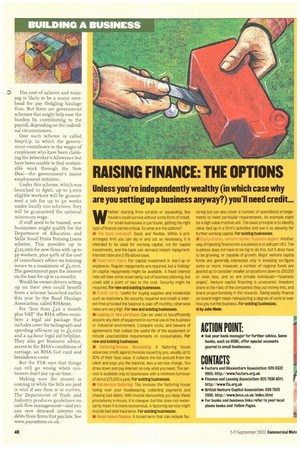RAISING FINANCE: THE OPTIONS
Page 40

If you've noticed an error in this article please click here to report it so we can fix it.
Unless you're independently wealthy (in which case why are you setting up a business anyway?) you'll need credit...
Whether starting from scratch or expanding, few -,auliers could survive without some form of credit. For small businesses in particular, getting the right type of finance can be critical. So what are the options?
a .ii ...T Basic and flexible. Within a prearranged limit you can dip in and out as necessary. It is intended to be used for working capital, not for capital investments, and the bark can demand instant repayment. Interest rates are 2,5% above base.
a i • For capital investment in start-up or expansion. Regular repayments are required, but a 'holiday' on capital repayments might be available. A fixed interest rate will take some uncertainty out of business planning, but could add a point or two to the cost, Security might be required. For new and mdsting businesses.
• • ' Useful for buying supplies and incidentals such as stationery. No security required and credit is interest-free provided the balance is paid off monthly; otherwise rates are very high. For new and Endsting businesses.
• I easr:i.i ci:hire pia cirasei Can be used to tax-efficiently acquire any item of equipment in normal use in the business or industrial environment. Compare costs, and beware of agreements that outlast the useful life of the equipment or include unacceptable requirements on consumables. For new and existing businesses.
m • ... A factoring house advances credit against invoices issued by you, usually up to 80% of their face value. It collects the full amount from the client and pays you the balance, less a service charge. You draw down and pay interest on only what you need. The service is available only to businesses with a minimum turnover of about £75,000 a year. For existing businesses.
• =Lill -serviue taoloririf: This involves the factoring house taking over your bookkeeping, collecting payments and chasing bad debts. With invoice discounting you keep these procedures in-house. It is cheaper, but this does not necessarily mean it is more economical. A factoring service might include bad debt insurance. For existing businesses.
II Asset-based finance: A broad term that can include fac toring but can also cover a number of specialised arrangements to meet particular requirements. An example might be a high-value tractive unit. The basic principle is to identify value tied up in a firm's activities and use it as security for further working capital. For existing businesses.
• • Another way of injecting finance into a business is to sell part of it. The business does not have to be big to do this, but it does have to be growing, or capable of growth. Maior venture capital funds are generally interested only in investing six-figure sums or more. However, a number of regional funds are geared up to consider smaller propositions down to .£10,000 or even iess, and so are private individuals—business angels'. Venture capital financing is unsecured. Investors share in the risks of the companies they put money into, and share proportionately in the rewards. Taking equity finance on board might mean relinquishing a degree of control over how you run the business. For existing businesses.
• by John Hinde




























































































































































